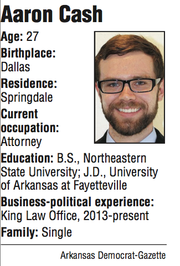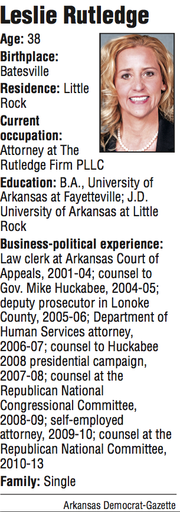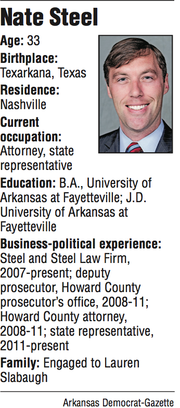In the race to replace Arkansas Attorney General Dustin McDaniel, one candidate is campaigning against Washington, D.C., while another is emphasizing in-state problems.
Republican candidate Leslie Rutledge, a former aide to Gov. Mike Huckabee, touts her varied law experience, as well as conservative bona fides, as qualifications for her to be the state's top attorney. She also promises to protect Arkansans from federal regulators and the Obama administration.
Democratic state Rep. Nate Steel, a small-town attorney and former prosecutor, says he is focused more on protecting law-abiding Arkansans from criminals. He has proposed a series of initiatives that tackle the state's prison and parole crisis, promote juvenile justice changes and increase support of the office's fight against cybercrimes.
Libertarian Aaron Cash, a Springdale attorney, wants to protect gun and privacy rights. He says he'll also fight drug laws that have contributed to overcrowding in state prisons, county jails and parole officer caseloads.
Hal Bass, a professor at Ouachita Baptist University, said the race is a bit of an oddity.
For one thing, he said, the race is competitive. In a state that hasn't elected a Republican to the office since Reconstruction, attorney general races were usually won or lost in the Democratic Party.
Rutledge would also be the first woman to hold the post.
In another unusual turn, Bass said, Rutledge is breaking recent tradition by campaigning against the federal government.
"The traditional role of the attorney general in Arkansas has not been to fight Washington. [Rutledge] is trying to nationalize it and make it about Arkansas vs. Washington," he said. "I think she's trying to take advantage of this virulent anti-Obama sentiment that's there in a substantial portion of the electorate. ... [Steel] is trying to shift the focus back to what is the traditional role and function of the office.
When asked why her opposition to the Obama administration and federal regulations is so central to her campaign, Rutledge said that intrusive regulations and edicts from Washington, D.C., hurt businesses and families in Arkansas and that past attorney generals, including McDaniel, haven't been assertive enough.
In particular, Rutledge says, McDaniel should have joined suits by other states' attorneys general challenging the Patient Protection and Affordable Care Act, also known as Obamacare.
"[Arkansas] is not an island. We're part of ... this country and therefore when the federal government implements regulations beyond the scope of what they should ... [Arkansans] need someone to stand up for them," Rutledge said. "This isn't political speech. This is a philosophy about ensuring Arkansans have the opportunity to grow their businesses and enjoy their families."
Rutledge, the daughter of a judge and a special education teacher, grew up on a cattle farm near Batesville and has varied experiences, including clerking in the Arkansas Court of Appeals and working as a staff attorney for Huckabee.
Beyond protecting Arkansas from intrusive regulations, Rutledge is also interested in expanding drug courts, helping fix a "broken" prison and parole system and protecting consumers from scam artists.
Unlike Steel, she does not have a legislative package, and said the attorney general is there to advise, not to advocate.
"My focus is on being the chief legal officer. ... My opponent's focus is being a legislator in chief," she said.
Steel, a Nashville native and former Nashville High School Scrapper defensive end and long snapper, has worked in private practice. He was also a deputy prosecutor before winning a seat in the state House of Representatives in 2010.
As a legislator, Steel supported McDaniel's creation of the cybercrimes unit -- a group of investigators who work with state, federal and local investigators to track child predators -- and said he wants to further invest in the division.
He said he also voted against Act 570, a criminal justice package from 2011. The law was supposed to reduce the states' prison numbers by changing sentencing as well as probation and parole procedures, but Steel said all it did was make things harder for local law enforcement.
"I've told several sheriffs around the state, Republicans and Democrats, sheriffs and prosecutors, that my first goal on Nov. 5 will be to call those folks and get them in a room to start talking about criminal justice reform from the bottom up," Steel said. "And not the top down."
If it weren't for the state's prison and parole crisis, one that began last year and has resulted in over-packed prisons and county jails, Steel said he may not have run.
Steel has made public safety, and fixing what he calls a "revolving door" in the state's prisons, his top priority. He also plans to advocate for "truth in sentencing," which would more closely align the sentences given with the number of years actually served.
He also supports legislation making sure that habitual violent and sexual offenders can't get parole.
"I suggest we limit parole for folks with a [long criminal past]," Steel said. "You know you're dealing with a dangerous criminals at that point and the fact that parole eligibility doesn't change a bit despite all [of the indicators of violent history] ought to worry everybody."
To free up prison space, he supports expanding drug courts and investing more in juvenile justice to prevent children from becoming career criminals.
Steel said he was once skeptical of drug courts, known to some law enforcement officials as a "hug a thug" approach. But his experience as a prosecutor taught him that it works, he said.
The Nashville attorney has said that he also plans on protecting Arkansas from federal overreach but that his main focus will be on getting things done in Arkansas.
"The Legislature is going to be crying out for [prison and parole] reform, but there are 135 of them. They are thirsting for leadership on this issue. It scares me that we'd have an attorney general more worried about partisan politics in Washington, and nationalizing that office, which I think would be a huge mistake to consumers and crime victims," Steel said. "Once we create an attorney general that is more concerned [about filing] lawsuits than public safety, I don't think we ever come back from that."
Cash thinks the key to cutting down prison rates is cutting the war against drugs.
"I don't think we should be wasting resources on it," he said. "The government should not be telling you not to smoke marijuana if you're not hurting someone else [while doing so]."
Cash is for limited government and, unlike the other two candidates, is against the death penalty as well as the state's ban on gay marriage. But he said he would be able to uphold the state's laws -- even those he considers ill-advised.
"Personal feelings can be put aside. I do that everyday in my practice," Cash said.
The campaign has intensified since September, with allegations of impropriety, even fraud, thrown by both sides.
On Sept. 12, the Arkansas Democrat-Gazette reported that after her 14-month stint as a staff attorney with the Department of Human Services, agency officials placed Rutledge on a "do not rehire" list, citing "gross misconduct" for the reasoning.
Rutledge, saying the hiring decision was politically motivated, has declined to release her complete personnel record.
On Sept. 30, Pulaski County Clerk Larry Crane tossed Rutledge off the county's voter rolls after learning she was still registered in Washington, D.C., and Virginia and had cast an absentee ballot in Arkansas in the 2008 election after registering to vote on the East Coast.
Rutledge contends that she followed the proper protocols after moving back to Arkansas and accused Crane, a Democrat who has contributed money to Steel's campaign, of "Chicago style" politics.
She came under fire again earlier this month after the publication of many of her old DHS work emails, including one she forwarded from a friend that was written in a dialect that some, including the state's black legislative caucus, found demeaning and offensive.
Rutledge did not apologize and said claims of racial discrimination had been hurtful.
"That is the opposite of who I am," she said.
On Oct. 14, the head of the state Republican Party, Doyle Webb, filed suit in Pulaski County Circuit Court against Steel, accusing Steel of violating the Arkansas Constitution by taking a job as the Nashville city attorney when he was already holding public office as a legislator.
Steel countered claims of malfeasance as "purely political" and denied holding the "city attorney" post, saying he is simply a contract employee doing work for the city. Prior to the complaint, Steel's own campaign website had referred to him as the Nashville city attorney. The claim has since been removed.
Ten years ago, the attorney general's office was a safe province of Democrats. But that's no longer the case, Bass said.
Since 2010, Democrats lost control of the General Assembly, a U.S. Senate seat, several U.S. House seats, and now could lose another senate seat as well as the governor's mansion.
Given that trend, Bass thinks Steel is doing the right thing by not emphasizing party affiliation in his campaign ads.
"The challenge for Steel in a down-ballot race is to keep the focus on the candidate as opposed to the party and ideology," Bass said. "The challenge on her [Rutledge] is to keep the focus on the national ties and national [political] trends."
Metro on 10/27/2014




